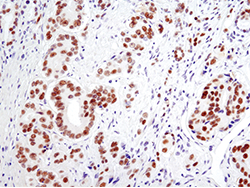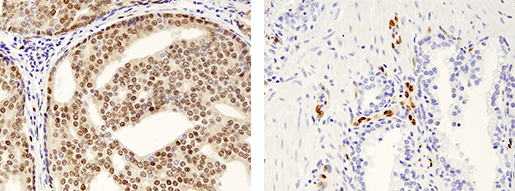Prostate Cancer
Androgen receptor (AR) signaling is the central signal transduction pathway in prostate cancer. Many different epigenetic mechanisms affecting this critical pathway play a role in disease initiation and progression. This includes the presence of AR variants that are constitutively transcriptionally active, interference with histone demethylase coactivators, and the formation of gene fusions of AR-responsive genes with transcription factors like ERG.
Start with these targets
Androgen Receptor
Androgen Receptor (AR) transcripts can include cryptic exons, which result in early termination of translation and proteins lacking in the ligand binding domain. AR-V7, a variant arising from a cryptic exon, leads to aberrant transcriptional regulation and is frequently expressed in castration-resistant prostate cancer (CRPC).
Products
Androgen Receptor (D6F11) XP® Rabbit mAb #5153 – WB, IP, IF, F, IHC, ChIP
Immunohistochemical analysis of paraffin-embedded human prostate carcinoma using Androgen Receptor (D6F11) XP® Rabbit mAb.
Androgen Receptor (E3S4N) Rabbit mAb (Carboxy-terminal Antigen) #70317 – WB, IP, IF
Androgen Receptor (AR-V7 Specific) (E3O8L) Rabbit mAb #19672 – WB, IP
Androgen Receptor Sampler Kit #61949
PathScan® Total Androgen Receptor Sandwich ELISA Kit #12850
FastScan™ Androgen Receptor (AR-V7 Specific) ELISA Kit #93577
Glucocorticoid Receptor
In some prostate cancers, Glucocorticoid Receptor (GR) signaling may aberrantly override expression of AR targets, inducing further cancer progression and AR-treatment resistance. In these instances, inhibition of Ezh2, which can act as a coactivator for Androgen Receptor, offers additional treatment options.
Products
Glucocorticoid Receptor (D6H2L) XP® Rabbit mAb #12041 – WB, IP, IF, F, IHC, ChIP, ChIP-seq
Chromatin immunoprecipitations were performed with cross-linked chromatin from A549 cells cultured in media with 5% charcoal-stripped FBS for 3 d and then treated with 100 nM dexamethasone for 1 hr and Glucocorticoid Receptor (D6H2L) XP® Rabbit mAb, using SimpleChIP® Enzymatic Chromatin IP Kit (Magnetic Beads) #9003. DNA Libraries were prepared from 5 ng enriched ChIP DNA using DNA Library Prep Kit for Illumina (ChIP-seq, CUT&RUN) #56795, and sequenced on the Illumina NextSeq. The figure shows binding across SLC19A2, a known target gene of GR (see additional figure containing ChIP-qPCR data).
Ezh2 (D2C9) XP® Rabbit mAb #5246 – W, IP, IF, F, IHC, ChIP, ChIP-seq
PathScan® Total Ezh2 Sandwich ELISA Kit #13278
HOXB13
HOXB13 is a transcription factor and marker of prostate cancer that is used to identify metastasis.
Products
HOXB13 (D7N8O) Rabbit mAb #90944 – W, IP, IHC
ERG
ERG overexpression occurs due to gene fusion with the androgen-driven promoter of the TMPRSS2 gene and is a key driver of prostate cancer metastasis.
Products
ERG (A7L1G) Rabbit mAb #97249 – W, IP, F, IHC
Immunohistochemical analysis of paraffin-embedded human prostate adenocarcinoma (two different cases) using ERG (A7L1G) Rabbit mAb.



